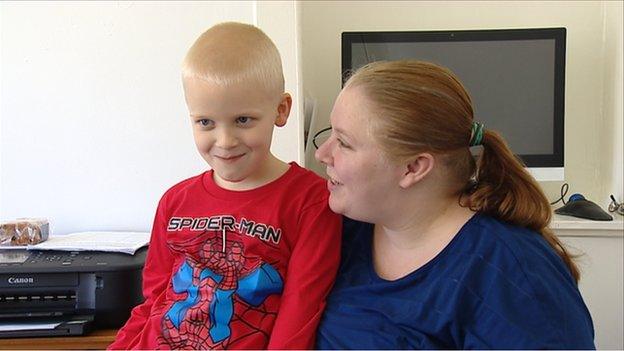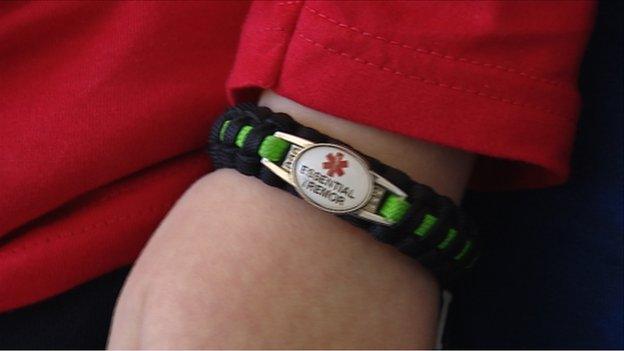Charity calls for greater recognition of 'essential tremor' as a disability
- Published

Greg McLelland, 6, was born with the condition but only diagnosed a year ago
A charity for people who have uncontrollable shaking is calling for the condition to be given greater recognition as a disability.
The Scotttish Tremor Society [a deliberate misspelling] says shaking is often mistaken for Parkinson's.
It is estimated that up to 6% of the population have "essential tremor" - a rhythmic trembling of the hands, head, legs, trunk and/or voice.
It can appear at any age, and is four times as common as Parkinson's.
Essential tremor is a disorder of the nervous system, but is not always due to trauma. It can be hereditary or caused by a stroke - or it can simply begin for no apparent reason.
Six-year-old Greg McLelland was born with the condition but his mum, Stacey, says it wasn't properly diagnosed until he was aged five.
"At first we thought it was epilepsy but then a year-and-a-half ago we got the proper diagnosis. It was actually a speech and language therapist who noticed the tremors."
Greg's shakes are worse at night.
"We had a single bed for him but we had to get bed guards to stop him falling out with the night tremors. We've now got him a new double bed and, fingers crossed, he won't fall out of this one.
"We don't know what the future holds for him. Now, his writing is very small and he doesn't write much. The school try to get him to do things without writing, or by using a tablet."
Mary Ramsay was also born with essential tremor but was 48 before she got a definite diagnosis.

Campaigners want to raise awareness of the condition
"I was getting to the stage where I wouldn't go out, I wouldn't eat or drink in public, I wouldn't write. I withdrew. But, in 1992. I went onto the internet and found the National Tremor Foundation."
Mary now runs the Scotttish Tremor Society which campaigns for greater recognition of the condition.
"There are three 't's. Two for Scottish and one for tremor," she said
"We have one lady whose mother was diagnosed with Parkinsons - I'm not sure how long ago - but she was put on medication for Parkinsons and it turns out it is essential tremor. So they have to wean her off the medication before they can start treating essential tremor."
"Mary's given us more information than the paediatrician has," says Mrs McLelland. "That's shocking."
The Scotttish Tremor Society has launched a petition calling on medical professionals and the government to recognise that it is a disabling medical condition.
The petition will be presented to the government in October.
Severe cases
"We are getting emails, phone calls, requests from America, Australia, New Zealand and a whole host of other countries. I basically can't keep up," said Mrs Ramsay.
Jamie Hepburn, the Scottish government's minister for sport, health improvement and mental health, said it anyone who experienced tremor symptoms should see their GP as soon as possible.
He also welcomed efforts to raise awareness of the condition.
"I understand that essential tremor can cause disruption to people's lives, particularly in more severe cases," he said.
"There are no specific treatments but it is possible to diminish the effects through appropriate medicines or other treatments in the most severe cases.
"Clinical advice, support, or appropriate referral to specialist services will be determined by GPs and based on an assessment of individual need. It is therefore essential that people who experience such symptoms seek advice from their GP as soon as possible."